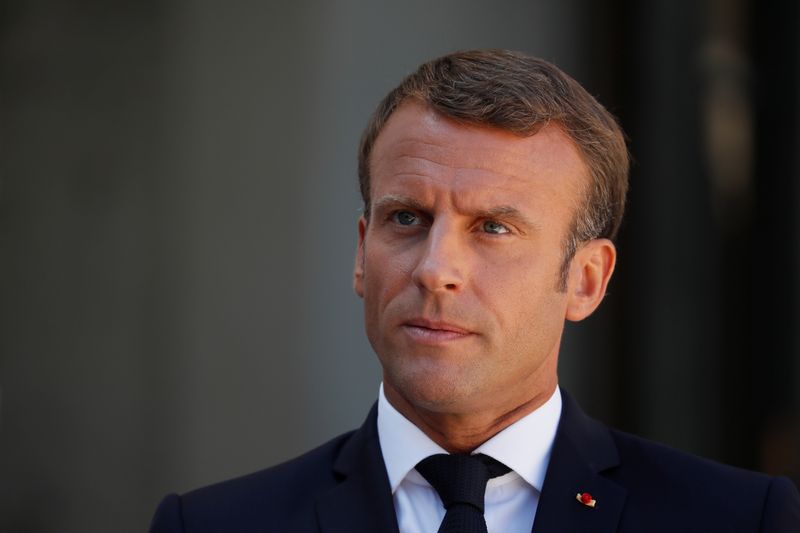This post was originally published on this site
https://i-invdn-com.akamaized.net/trkd-images/LYNXMPEG9M0ZN_L.jpg
PARIS/BRUSSELS (Reuters) – France is preparing its fishing industry for a smaller catch after Brexit, industry members said, in a sign that President Emmanuel Macron is laying the ground for a delicate compromise to help the European Union strike a trade deal with Britain.
The EU and Britain are trying to hammer out an agreement over the next three weeks to avoid damaging $900 billion in annual trade when Britain leaves the bloc’s single market on Jan. 1, 2021. Fisheries is among the biggest obstacles.
Macron has publicly taken a hard line on fisheries, saying France would not accept any Brexit pact that “sacrifices our fishermen”. He rejected London’s demand for annual negotiations on fish quotas in British waters, saying it damages EU industry.
In a first sign of a tentative softening of Paris’ stance, however, Macron said after last week’s summit of EU national leaders dedicated to Brexit that the French industry will no longer be in the same situation as today after year-end.
Privately, his government has gone further, bluntly telling France’s politically influential fishing industry to brace for impact, sources told Reuters, in comments that instantly pushed sterling and British bond yields higher.
France has a total of 20,000 fishermen, on top of 10,000 fish processing jobs. On average in 2011-2015, some 98,000 tonnes of fish were caught in British waters, representing 171 million euros in turnover and 2,566 direct jobs.
A fourth of France’s catch in the northeastern Atlantic was in British waters, according to a French parliamentary report.
As the EU summit was convening in Brussels last week, Macron’s Europe minister posted pictures from a visit to the French coastal town of Port-en-Bessin.
“One single objective: to defend and protect the interests of fishermen,” Clement Beaune said on Twitter. “We’re fighting… for French fishing.”
But – in previously unreported exchanges – Jerome Vicquelin, a member of local fishing lobby groups who attended the meeting, said the minister’s message was starker when asked off-camera if France would yield.
“I was rather blunt and said: ‘It’s all well and good you came, but I’m worried because… just a 10-15% cut in turnover… would be a disaster over the long term,” Vicquelin said he told the Paris envoys in the wheelhouse of fishing boat aptly called L’Europe.
“They were blunt too. They said it won’t be the same as before. For me it’s clear, they just want to try to limit damages as much as possible,” Vicquelin told Reuters.
Asked to comment on Vicquelin’s account of the meeting, Beaune told Reuters he had told the industry representatives to no longer expect to maintain “the status quo”.
MACRON HOLDS THE KEY
The exchange illustrates France’s twin strategy in the Brexit negotiation – talking tough in public while quietly preparing to fish less in British waters from 2021.
In another example of Paris eyeing a possible compromise, a fisheries source told Reuters separately the French government has already asked the industry what concessions would be acceptable to them.
“They asked us if potentially, really potentially we were ready to make concessions,” said the source, who declined to be named. “They asked us to think about it.”
Many French and other EU vessels now fish in the rich British waters that would be beyond reach if there is no deal. Any agreement would need to fix catch quotas for over a 100 species.
In an early indication of movement on fisheries from London, Britain last month offered a transition period from 2021 to increase its catch gradually rather than overnight.
But the sides remain seas apart on what exactly Britain’s share would be in the end.
Britain says it would become an “independent coastal state” controlling its waters and who fishes there once its transition out of the EU is complete.
EU fishing states including Germany and Ireland support France. But it is Macron, facing presidential elections in 2022, who leads the hardline rhetoric and will be instrumental in striking a fisheries pact.
He has to weigh up the risk of angering a small but thriving and vocal industry, with that of blocking the new Brexit pact, which would lead to tariffs and quotas damaging bilateral trade.
“Macron holds the key,” said an EU diplomat following Brexit. “If France climbs down, we can get a deal.”
Bidding for continued access to the UK fishing waters, the EU is also at odds with London over conditions to keep the bloc’s common market of 450 million consumers open to British companies. The two can only be solved together, if at all.
Another diplomat said EU Brexit negotiator, Michel Barnier, this week “wasn’t worried about anything else but fish”.
“He said Macron has to put on the political show as 20% of their fishermen or vessels are ‘jobless’ if they don’t get their quotas,” the person said of a closed-door meeting with Barnier.
“Macron has to fight not to have the fishermen on the streets. That’s why the French are publicly still in full throttle.”

